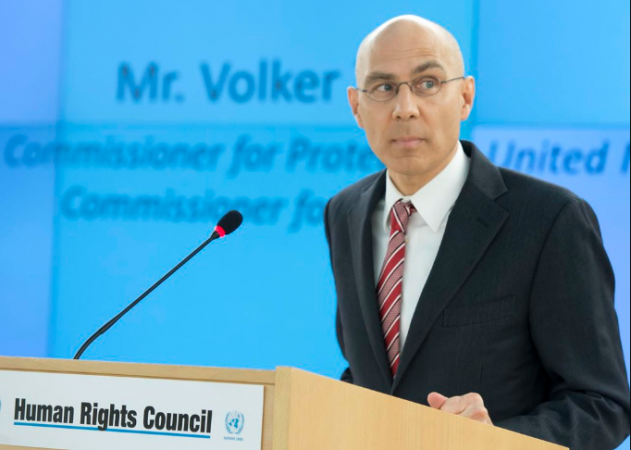
USA: Volker Turk, the UN High Commissioner for Human Rights, urged the international community on Tuesday to take "decisive steps" to assist in determining the fate and whereabouts of those who have gone missing in Syria, to work towards the release of those who are still being held in the nation's prisons, and to offer their families the necessary support.
He urged UN members to take into account creating a new, focused organisation that would assist in providing answers and support to the families of the thousands who have vanished, as well as to survivors — "bringing clarity about what has happened to all the people of this wounded and exhausted country."
Turk stated that the pursuit of justice for missing people is a requirement for long-term peace and reconciliation in the nation at an informal gathering of the General Assembly to hear a briefing from UN Secretary-General Antonio Guterres on missing people in Syria.
Also Read: Volodymyr Zelensky: Vladimir Putin has "lost everything" in the year-long conflict with Ukraine
During a security council meeting last week, Bassam Sabbagh, Syria's permanent representative to the UN, attacked the West's efforts to establish such a body, calling them a "hostile" campaign that is turning the issue of missing persons into a weapon. Additionally, to "launch another politicised international mechanism, whose sole purpose is to misrepresent the truth and put more pressure on a nation that has been battling terrorism on behalf of all peoples of the world."
Turk nevertheless expressed his continued optimism to Arab News after the meeting that "the Syrian government will come to the realisation that there can be no future for the country without addressing the issue of the missing people."
Five nations that have experienced conflict and missing persons have spoken to us (at the GA meeting), and they have all emphasised the same thing: You cannot address the grievances of your population if you don't address the fate of missing persons.
"I know how important it is for them because I've worked with Syrian refugees for many years," the speaker said.
Since the start of the conflict 12 years ago, more than 100,000 Syrians have either been missing or forcibly disappeared at the hands of the Syrian regime, the opposition, and terrorist organisations.
Also Read: Russian intercontinental ballistic missile exercises begin
Many nongovernmental, international, humanitarian, and family organisations, such as the International Committee of the Red Cross, the International Commission on Missing Persons, and the Independent International Commission of Inquiry on the Syrian Arab Republic, work on the Syria missing persons issue by gathering data and monitoring cases.
However, the lack of coordination leaves victims, survivors, and their families in a state of limbo, looking for any sign of their loved ones while unsure of where to provide information and data.
Families have pushed for a committed, impartial international organisation that is adequate to the scope and complexity of the crisis to shed light on the fate of their loved ones.
The UN secretary-general released a report last year that was informed by their opinions and recommendations and came to the conclusion that such a global organisation, with a broad mandate to shed light on the whereabouts of the missing and support their families, would be the cornerstone of an all-encompassing solution to the crisis.
In his remarks, Guterres urged the gathering's participants "to act" and work to resolve "this deeply painful situation with determination and urgency," and he urged the Syrian government and all other parties to the conflict to cooperate.
Turk described the crisis of missing people in Syria to the audience, painting a picture of despair that is "crushing in its enormity," where children are developing with a "gaping absence where their father should be," and where being friends with a missing person's family could incite further violence in the neighbourhood.
Additionally, families who are looking for missing loved ones run the risk of being exploited, threatened physically, and demanded to pay money in exchange for information about their whereabouts that may later turn out to be false.
He claimed that after being released from arbitrary detention in Syria, survivors there spoke of widespread sexual assault and torture, where "death has been a close and constant neighbour." Many women and girls are shunned by their families after being released, Turk continued, because they are believed to have been sexually assaulted and are therefore bringing shame to their kin.
Also Read: Official: China shouldn't "overreact" to the visit of the president of Taiwan to the US
Many female disappearance survivors have attempted suicide or disappeared again by leaving the country as a result of this horrifying accumulation of trauma.
The suffering, loss, and injustice are just too great.
The new organization's responsibilities will include gathering all of the data and claims currently available, promoting access to detention facilities, and supporting victims, survivors, and their families by attending to their psychosocial, legal, administrative, and financial needs.